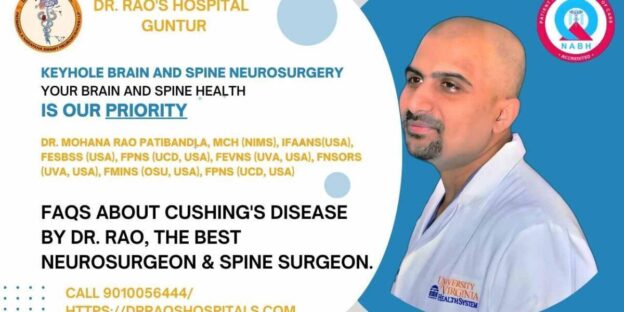The best neurosurgical treatment for pituitary tumors: Restoring Hormonal Balance
Discover how Dr. Rao’s Hospital, the best neurosurgery center in India, and Dr. Rao, the leading neurosurgeon, provide advanced neurosurgical treatment for pituitary tumors to restore hormonal balance and improve patients’ quality of life.
Introduction:
Pituitary tumors can significantly disrupt hormonal balance in the body, leading to various health complications. Fortunately, neurosurgery offers effective treatment options to restore hormonal balance and improve patients’ overall well-being. At Dr. Rao’s Hospital, the best neurosurgery center in India, under the expertise of Dr. Rao, the leading neurosurgeon, patients receive comprehensive care for pituitary tumors to achieve optimal outcomes.
Understanding Pituitary Tumors
The pituitary gland, located at the base of the brain, plays a crucial role in regulating hormones throughout the body. Pituitary tumors, abnormal growths in the gland, can disrupt hormonal balance and lead to diverse symptoms. These tumors can be non-functioning, meaning they do not produce hormones, or functioning, meaning they secrete hormones such as prolactin, growth hormone, or adrenocorticotropic hormone (ACTH). Functioning tumors are further classified based on the specific hormones they produce.
Causes and Risk Factors
While the exact causes of pituitary tumors are still unknown, certain risk factors increase their likelihood. Some things that can cause a pituitary tumor to grow are a genetic predisposition, inheriting certain conditions (like multiple endocrine neoplasia type 1), and radiation exposure to the head and neck area.
Symptoms and Diagnosis
The symptoms of pituitary tumors vary depending on their size, hormone secretion, and impact on surrounding structures. Common symptoms include headaches, vision problems, hormonal imbalances (e.g., irregular menstrual periods, changes in libido, growth abnormalities), and neurological issues (e.g., dizziness, memory problems). Proper diagnosis involves a combination of medical history evaluation, hormonal level assessment, and imaging techniques such as magnetic resonance imaging (MRI) or computed tomography (CT) scans.
Treatment Options for Pituitary Tumors
Dr. Rao’s Hospital offers a range of advanced treatment options for pituitary tumors tailored to patients’ needs. The primary treatment approach for most pituitary tumors is surgery, specifically transsphenoidal surgery. This minimally invasive technique involves accessing the pituitary gland through the nasal cavity or upper lip, thereby avoiding the need for a craniotomy. In complex cases or large tumors, open craniotomy may be required. Dr. Rao’s expertise in neurosurgery ensures the highest level of precision and safety during the procedure.
Restoring Hormonal Balance
Restoring hormonal balance is a crucial goal of neurosurgical treatment for pituitary tumors. Depending on the type of tumor and its impact on hormone production, hormone replacement therapy (HRT) may be required after surgery. For example, in cases of hormone-secreting tumors, such as prolactinomas or growth hormone-secreting adenomas, medications may be prescribed to normalize hormone levels. The endocrine team at Dr. Rao’s Hospital works closely with patients to develop individualized hormone replacement plans to ensure optimal hormonal balance and overall well-being.
Risks and Complications
As with any surgical procedure, there are potential risks and complications associated with neurosurgical treatment for pituitary tumors. However, with Dr. Rao’s extensive experience and advanced surgical techniques, the risks are minimized, and complications are rare. Dr. Rao’s Hospital provides comprehensive pre-operative evaluation and post-operative care to mitigate potential risks and enhance patient outcomes. Patients are closely monitored for possible complications such as cerebrospinal fluid leaks, infection, or vision changes. Dr. Rao and the skilled medical team at Dr. Rao’s Hospital prioritize patient safety and take proactive measures to minimize these risks. Pre-operative assessments, meticulous surgical techniques, and post-operative care ensure a smooth recovery process for patients undergoing neurosurgical treatment for pituitary tumors.
Rehabilitation and Follow-up Care
Following neurosurgical treatment for pituitary tumors, rehabilitation, and long-term follow-up care is crucial for optimal recovery. Rehabilitation may include hormone level monitoring, lifestyle modifications, and regular check-ups to ensure patients maintain hormonal balance and overall health. The endocrine team at Dr. Rao’s Hospital provides ongoing support to patients, assisting them in managing their hormone replacement therapy effectively and addressing any concerns or complications that may arise.
Multidisciplinary Approach
Treating pituitary tumors requires a multidisciplinary approach to ensure comprehensive care. At Dr. Rao’s Hospital, a team of specialists collaborates to provide patients with the best possible outcomes. This interdisciplinary team includes neurosurgeons, endocrinologists, radiologists, and other healthcare professionals who work together to develop personalized treatment plans, monitor progress, and optimize long-term health.
Research and Innovation
Dr. Rao’s Hospital is at the forefront of neurosurgical advancements and continually strives to improve treatment options for pituitary tumors. Through active involvement in research and clinical trials, Dr. Rao and the medical team explore innovative techniques and therapies to enhance surgical outcomes and minimize potential side effects. This dedication to research ensures that patients receive the most advanced and effective neurosurgical treatment available.
Conclusion:
Neurosurgical treatment plays a vital role in restoring hormonal balance for patients with pituitary tumors. At Dr. Rao’s Hospital, the best neurosurgery center in India, Dr. Rao, the best neurosurgeon, leads a skilled team that effectively manages pituitary tumors. Dr. Rao’s Hospital strives to restore hormonal balance, improve quality of life, and provide the best possible outcomes for patients with pituitary tumors by utilizing advanced techniques, personalized care, and a multidisciplinary approach.
Dr. Rao’s Contact Information:
- Phone: 9010056444, 9010057444
- Email: info@drraoshospitals.com
- Address: Old Bank St, GV Thota, beside AK Biryani Point, Guntur, Andhra Pradesh 522001
- Website: Dr. Rao’s Hospital
Hashtags: #Neurosurgery #PituitaryTumors #HormonalBalance #DrRaosHospital #BestNeurosurgeon #AdvancedTreatment

